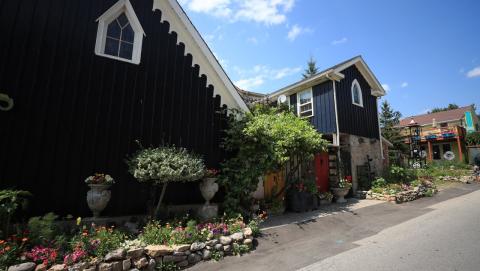If you are in an urgent situation, contact 911 for emergency services in your area. The following 24/7 crisis lines are also available in Ontario:
Assaulted Women’s Helpline – call 1-866-863-0511, or TTY 1-866-863-7868, or text #SAFE (#7233)
Fem’aide helpline (French only) – call or text 1-877-336-2433, or TTY 1-866-860-7082, or Online chat
Talk4Healing (helpline for Indigenous women) – call or text 1-855-554-4325, or Online chat
Other emergency supports or additional support services are also available.
In 2023, AMO joined many of our members in recognizing that gender-based and intimate partner violence is an epidemic in Ontario that requires urgent and coordinated government action. By making this declaration, AMO recognizes municipal governments are key partners in responding to issues of intimate partner violence, gender-based violence, and violence against Indigenous women.
As municipalities address the epidemic of intimate partner violence in this province, consideration must be given to the disproportionate rates of intimate partner violence experienced by Indigenous women and the multiple barriers Indigenous women face when seeking help. Municipalities and other jurisdictions should work with, and support, Indigenous women, their organizations, and communities to end the unacceptable levels of violence against Indigenous women and consider recommendations recently made by the Ontario Indigenous Women’s Advisory Council.
Municipalities play a multifaceted role in addressing gender-based violence through our roles in public safety, community outreach, resource planning, and service delivery. We have heard from many of our members that since making their declarations, they have grown, expanded, and initiated new responses to intimate partner violence and gender-based violence. This toolkit aims to equip municipal elected officials who are ready to take on more action in their communities with the tools and resources to support their next steps.
Last Updated: December 8th, 2025. This resource will continue to be updated as new resources and tools are developed or identified. If you have a resource that would be helpful to share with AMO members, please contact policy@amo.on.ca.
AMO Acknowledges and appreciates the input provided by partner organizations and key readers to inform this resource toolkit.
Backgrounders for Municipalities
Backgrounders for Municipalities
After the Declaration – What AMO Members Can Do to Help Prevent Femicide
This brief is written to provide information and ideas for AMO members to help grow a whole community response to IPV. If it is true that everyone has a role to play in femicide prevention, then it is important to become aware of, and support people in the different roles, and to learn the role each of us can play.
Understanding Gender-Based Violence
Family service agencies are essential partners in addressing GBV, offering a range of support that spans prevention, intervention, and recovery for individuals and families impacted by GBV. This guide provides municipal leaders with what they need to know about the services family service agencies provide.
Resources on Prevention and Response on Economic Abuse
These fact sheets and posters provide information for survivors, social services, and bank staff on economic abuse. This resource can be shared with the public and is available in multiple languages.
Unacceptable: Responding to Technology-Facilitated Gender-Based Violence
Unacceptable: Responding to Technology-Facilitated Gender-Based Violence, a guide developed by LEAF, defines and describes different forms of technology-facilitated gender-based violence (TFGBV). The guide also outlines steps that people experiencing TFGBV can take to address the violence, including potential legal remedies.
Trainings for Staff and Residents
Trainings for Staff and Residents
Meeting your Ontario Occupational Health and Safety Act Obligations
Make It Our Business provides information and education to help employers and other workplace stakeholders to meet their obligations under the Ontario Occupational Health and Safety Act. Can be offered as a 1-hour free training to employers in your community. Municipalities can encourage local businesses to offer this training through their local BIAs and Chambers of Commerce.
Identifying Risks and Signs of Intimate Partner Violence (IPV)
Neighbours, Friends & Families is a public education campaign to provide information about the risks and signs of IPV, how you can safely intervene, and actions you can take to address it. It also includes culturally appropriate campaigns that have been adapted to meet the needs of immigrants and refugees, Indigenous communities, and Francophone communities. It also includes Rural Roots, a specific resource for rural communities developed in partnership with Luke’s Place.
The Ontario Association of Interval and Transition House (OAITH) Training Hub offers competency-based, self-paced online courses designed for anyone supporting survivors of gender-based violence. Dozens of self-paced courses are available in French and English designed to equip learners to respond effectively and promote survivor safety. Courses are purchased individually.
Currently Available Courses: https://www.oaith.ca/train/current-courses.html
Planning for Equitable and Inclusive Cities
This document is written as a companion training module to the Equity and Inclusion Lens training for city planners. It is meant to stimulate creative and transformational thinking around planning decisions, processes, and policies.
Safer Spaces for 2S-LGBTQ+ Communities
Safer Spaces provides organizational assessments, professional development workshops, and consultation services to create more inclusive programs and workplaces for 2S-LGBTQ+ communities. Training topics include understanding the ways in which 2S-LGBTQ+ communities are disproportionately impacted by violence, poverty, and health inequities.
WorQshop offers current, fun, and informative 2SLGBTQIA+ inclusion training to health and social services and other workplaces and groups, including specific trainings on intimate partner violence in 2SLGBTQIA+ communities. They offer virtual and in-person trainings, as well as consultation services.
Privacy and Information Sharing
Privacy and Information Sharing
Privacy and Information Sharing
Sharing Information in Situations Involving Intimate Partner Violence: Guidance for Professionals
The Office of the Information and Privacy Commissioner of Ontario (IPC) developed guidance in response to the 2022 Ontario coroner’s inquest into the tragic deaths of Carol Culleton, Anastasia Kuzyk, and Nathalie Warmerdam in Renfrew County due to intimate partner violence (IPV). Through comprehensive consultations with 22 organizations across the justice, health, social services sectors, including survivors of IPV, this guidance clarifies that Ontario’s privacy laws are not a barrier to disclosing personal information in situations involving IPV. Through decision trees and hypothetical scenarios, it walks professionals through key privacy provisions to assist in their decision-making around whether to share information to prevent injury or loss of life.
Responsible information-sharing in situations involving intimate partner violence
During Woman Abuse Prevention Month in November 2024, Information and Privacy Commissioner of Ontario Patricia Kosseim alongside Canada’s privacy regulators issued a joint resolution to guide the responsible disclosure of personal information in situations involving IPV. Aligned with the Office of the Information and Privacy Commissioner of Ontario’s guidance, Sharing Information in Situations Involving Intimate Partner Violence, this joint resolution calls for a collective effort from governments and organizations to develop privacy-compliant governance frameworks for responsible information-sharing in cases involving risk of serious harm to life, health, or safety.
Addressing intimate partner violence: Information sharing, trust, and privacy
In this episode of Info Matters, Information and Privacy Commissioner of Ontario (IPC) Patricia Kosseim speaks with Priya Shastri, Director of Programs at WomanACT, to discuss how timely information sharing is crucial to prevent harm resulting from intimate partner violence (IPV). They discuss why professionals in some cases may hesitate to share information due to misunderstandings about privacy laws and how the IPC’s guidance, Sharing Information in Situations Involving Intimate Partner Violence, can help address these challenges. Priya also provides insights from the front lines on information sharing, building trusting relationships with victims and survivors, and taking a collaborative, trauma informed approach to combatting IPV.
Evaluation
Evaluation
Prevention of Sexual Exploitation and Abuse (PSEA) Organizational Assessment Tool
Digna's target audience is organizations working in international cooperation, so the resources and trainings provided may need adaptation to the Canadian context but are available to all who need them. This no-obligation, customizable self-assessment is a useful tool that helps organizational leaders to gain a better understanding of the strengths and weaknesses of their organization’s prevention of sexual exploitation and abuse. Data can also be voluntarily shared annually to enable Digna to measure progress throughout the sector and identify gaps in supports that can be filled throughout the following year. Email digna.info@cooperation.ca for more information.
Resources for Evaluating Trauma- and Violence-Informed Practice
This resource provides an overview of over twenty qualitative and quantitative evaluation tools designed to measure trauma-and violence-informed practices of individuals and /or organizations. These tools have been specifically designed to support individuals and organizations in assessing trauma- and violence-informed (TVI) practices at various stages.
Resources for Decision-Making and Service Delivery
Resources for Decision-Making and Service Delivery
10 Ways to Invest in Survivor Expertise
Gender-based violence survivors provide knowledge, leadership, and guidance on the various forms and impacts of gender-based violence, as well as the successes and barriers they encounter in support-seeking and healing. In this way, survivors can be considered as holding specialized expertise on gender-based violence that cannot be acquired through any other source. This infographic identifies everyday actions and structural changes that can be adopted at the organizational level to ethically and equitably include and center survivor expertise.
Advancing Equity and Inclusion: A Guide for Municipalities
This guide is for elected officials who wish to create Council mandates and strategic priorities that are responsive to constituents; senior and middle management who seek to establish policies, practices, and procedures in human resources and operations that reflect the population; and municipal staff at all levels of the organization who may be in touch with emerging issues and opportunities. This guide presents a flexible approach to equity and inclusion and is adaptable to the diverse structures, contexts, and experiences of municipalities from across Canada.
An Equity-Focused Population Health Approach to Gender-Based Violence
The GBV Prevention Framework provides an equity-focused population health approach for GBV prevention. The Framework was developed for Ontario’s local public health agencies and may also be relevant to public health professionals in other areas, provincial and municipal civil servants, anti-violence organizations, and others. The primary focus of the GBV Prevention Framework is on strategies to prevent GBV from occurring in the population. It is intended to be used along with the expectations set out in the Ontario Public Health Standards to support local public health agencies in their efforts to advance health equity.
Digna’s Directory of Prevention of Sexual Exploitation and Abuse (PSEA) Service Providers
Digna's target audience is organizations working in international cooperation, so the resources and trainings provided may need adaptation to the Canadian context but are available to all who need them. Digna has collected a growing list of PSEA service providers across Canada and around the world. The list includes professionals specialized in training, safeguarding, investigations, complaints and reporting mechanisms, and many other specializations. The database can be filtered according to various criteria.
Economic Abuse Screening Tool (EAST)
The Economic Abuse Screening Tool (EAST) can be shared with social service providers to assist them in identifying and addressing instances of economic abuse experienced by their clients. EAST equips these providers with the information and skills necessary to assess the scope and nature of economic abuse and provides them with a range of resources to help victim-survivors access critical economic resources.
Going the Distance: Supporting Rural and Remote Survivors with Family Law Issues
The way violence plays out and the effectiveness of policy and service responses are profoundly shaped by where people live. This resource is divided into two sections, 1) Understanding the Rural and Remote Experience and 2) Strategies for Supporting Rural and Remote Women. The first section is designed for workers and decision-makers who are unfamiliar with the challenges and experiences that come with rural and remote living. It may also affirm the experiences of workers and women living in small communities. The second section helps us all think of ways to support violence survivors in these areas.
Supporting Survivors of Intimate Partner Violence (IPV) in the Workplace
This two-part Backgrounder supports GBV service providers in deepening their understanding of how IPV can affect survivors at work, and in supporting survivor safety, rights, and survivor-led choices in the context of employment. It offers practical ways to recognize how IPV shows up in the workplace and how to respond with trauma- and violence-informed and survivor-centered strategies.
MMIWG2S+ and Violence Prevention Supports Toolkits
These toolkits on topics including tenant housing rights, landlord housing rights, housing for pets, and family violence housing are a guide for respectful, informed engagement on MMIWG2S+ in communities.
The Greater Sudbury Police Service is responding to Recommendations 40 and 41 of the Truth and Reconciliation Commission Calls to Action. They are also taking action to build awareness on MMIWG issues and to assist families wherever possible. This toolkit is meant to provide families with information and resources to assist them during the time their loved one is missing. It is also intended to provide police investigators with timely information to ensure essential steps in locating loved ones are undertaken.
The Women’s Legal Education & Action Fund (LEAF)
LEAF has engaged in legal advocacy to advance gender equality rights in Canada since 1985. We provide public legal education—including custom workshops— to groups and institutions interested in learning more about issues related to gender equality. If you are interested in learning more, please reach out to info@leaf.ca.
Mulberry provides contact information for a variety of services, including emergency women’s shelters, sexual assault centers, community GBV services and many more. Information regarding services can be accessed through a service listing, a map-based search and via tailored search results populated via an interactive GBV services quiz.
The OAITH Resource Library contains hundreds of evidence-based resources focused on gender-based violence, including infographics, reports, and videos. Find what you need, when you need it by searching for resources by target audience, topic, format or language.
Examples of available topics Include:
- Legislation and Policy
- Family Law
- Femicide
- Stalking and harassment
- Immigration status
The Counselling Finder was designed by Family Service Ontario as a collaboration tool with their member agencies to help the public find counselling services online. FSO member agencies employ registered professionals who practice psychotherapy and have been providing services to men, women, children and couples for decades.
Safe Passage is an initiative of the Native Women’s Association of Canada. It a national tracking and mapping tool that identifies safety concerns for Indigenous women, girls, and Two-Spirit people.
See It, Name It, Change It is all about starting conversations, learning about healthy relationships, and finding ways to make communities safer and happier for everyone. This is done through identifying what violence looks like, how to call it out, and how to end violence in your community. The campaign includes resources and ideas for programs.
Advocacy Tools
Advocacy Tools
Culleton, Kuzyk & Warmerdam (CKW) Inquest Advocacy Toolkit
Luke’s Place Support and Resource Centre for Women and Children has developed this toolkit to assist organizations that do not have the time or resources to develop their own advocacy strategy and tools related to implementation of the Inquest recommendations. The resource continues to be updated as new tools and resources are added.
Calls to Action for Municipalities
The Canadian Center for Women’s Empowerment (CCFWE) compiled several tangible measures municipalities can take to support Economic Abuse survivors in their community and promote their safety and well-being. CCFWE also has recommendations and calls to action for provincial and territorial governments that may be useful for municipalities to keep in mind.
Red Dress Day and NWAC’s Faceless Dolls Project
This resource provides important background on Red Dress Day, its significance, and how elected officials and communities can meaningfully engage.
We Count Femicide Because is an initiative led by the Ontario Association of Interval and Transition Houses (OAITH) with support from Building a Bigger Wave Ontario Network (BBW) and Action ontarienne contra la violence faite aux femme to call attention to and address Femicide rates in Ontario. We Count Femicide Because raises a public alarm every time a femicide occurs in Ontario, drawing attention to the critical need for investments in prevention and to engage leaders in communities and at all levels of government in dialogue focused on the collective work needed to prevent femicide.
Organized by the Ontario Association of Interval & Transition Houses (OAITH), the Wrapped in Courage campaign provides opportunities throughout Woman Abuse Prevention Month (November) and the 16 Days of Activism to End Gender Based Violence (November 25th- December 10th) to take action towards ending gender-based violence (GBV). Community members, leaders and elected officials are asked to recognize gender-based violence (GBV) as a non-partisan issue by wearing purple scarves and proclaiming November 25th as the International Day for the Elimination of Violence Against Women.
Reports, Recommendations, and Action Plans
Reports, Recommendations, and Action Plans
The National Inquiry’s Final Report reveals that persistent and deliberate human and Indigenous rights violations and abuses are the root cause behind Canada’s staggering rates of violence against Indigenous women, girls and 2SLGBTQQIA people. The two-volume report calls for transformative legal and social changes to resolve the crisis that has devastated Indigenous communities across the country. It delivers 231 individual Calls for Justice directed at governments, institutions, social service providers, industries and all Canadians.
Culleton, Kuzyk & Warmerdam Inquest Jury Recommendations
On September 22, 2015, three women were murdered in Renfrew County. In 2017, Basil Borutski was convicted of first-degree murder charges in the deaths of Anastasia Kuzyk, Nathalie Warmerdam and Carol Culleton. The Culleton, Kuzyk, & Warmerdam Inquest took place in June 2022 and made 86 recommendations to prevent intimate partner violence (IPV).
Mass Casualty Commission Final Report – Turning the Tide Together
The Mass Casualty Commission examines the April 18-19, 2020 killings of 22 people, including a pregnant woman, in Portapique, Nova Scotia. The Commission’s final report provides important lessons learned and recommendations for governments and institutions to improve community safety. The report crucially emphasizes the role of gender-based violence in mass casualties, and the need to address this violence to make communities safer. The Avalon Centre, LEAF, and Wellness Within developed and submitted a report reflecting the voices of marginalized members of the community and survivors affected by the perpetrator, and their suggestions for recommendations.
Ontario Intimate Partner Violence Inquest Recommendations
This chart developed by OAITH collates all IPV inquest recommendations that have been made in Ontario.
Through Ontario’s four-year plan, the Government of Ontario is building on existing efforts to prevent, address and respond to gender-based violence. This cross-government action plan will respond to sector needs and unique community contexts, with a focus on prevention and supporting people at the highest risk of experiencing violence.
Pathways to Safety is the provincial government-wide plan to address the root causes of violence against Indigenous women, children and 2SLGBTQQIA+ people.
The Leaders’ Pledge on Preventing and Addressing Sexual Misconduct
The Leaders’ Pledge on Preventing and Addressing Sexual Misconduct is a collective agreement developed by Canada’s international cooperation and humanitarian sector to prioritize the safety, dignity and rights of all people who the sector works with and serves. The renewed pledge focuses on organizational culture, and all leaders are invited to read the pledge, ask the hard questions of their organizations, and commit to doing better, together.
The National Action Plan to End Gender-Based Violence
The vision for the National Action Plan to End Gender-Based Violence is a Canada free of gender-based violence that supports victims, survivors, and their families, no matter where they live. Women and Gender Equality Canada worked with each province and territory to put in place bilateral agreements supporting the implementation of the National Action Plan. These agreements are flexible, allowing jurisdictions to address their respective priorities, needs and challenges.
OFIFC/ONWA Strategy to End Violence Against Indigenous Women
The Strategic Framework to End Violence Against Indigenous Women was coauthored by the Ontario Federation of Indigenous Friendship Centres (OFIFC) and the Ontario Native Women’s Association (ONWA). It was launched in 2007 and provides a framework for systemic change and guides work with partners and allies.
An Urban Sub-Working Group developed this chapter of the National Action Plan to eliminate violence against Indigenous women, girls, and 2SLGBTQQIA+ people, in response to the National Inquiry into Missing and Murdered Indigenous Women and Girls and the 61 Calls for Miskotahâ (change) specific to the Métis Nation. It focuses on First Nation, Inuit and Métis people living in small, medium and large communities, including rural, isolated and remote communities, which are: off-reserve; outside of their home community, community of origin or settlement; or outside of Inuit Nunangat (Inuit homelands).
NWAC Action Plan: Our Calls, Our Actions
This document is the Native Women’s Association of Canada’s action plan responding to the National Inquiry’s Calls for Justice. It includes clear policy pathways and priorities.
This report from the Ontario Native Women’s Association sets out recommendations to address the national crisis of Missing and Murdered Indigenous Women and Girls, based on the engagement and leadership of over 5,700 Indigenous women.
This statement from the Indigenous Women’s Advisory Council in Ontario sets out recommendations for municipalities and the province to address the disproportionate levels of gender-based violence perpetrated against Indigenous women and girls, including intimate partner and family violence.
AMO acknowledges and appreciates the input provided by partner organizations and key readers to inform this resource toolkit.




